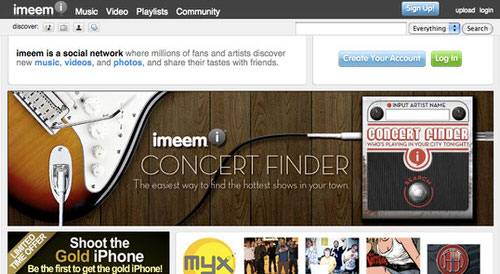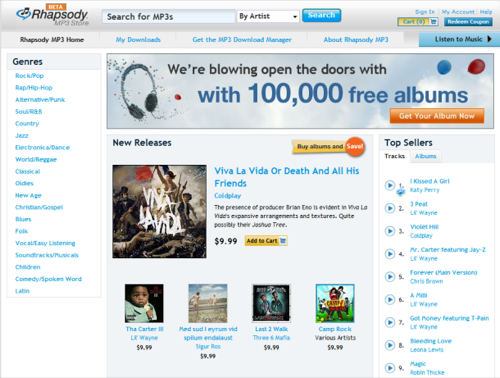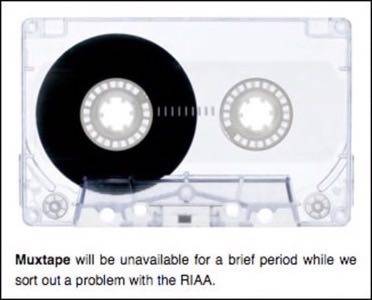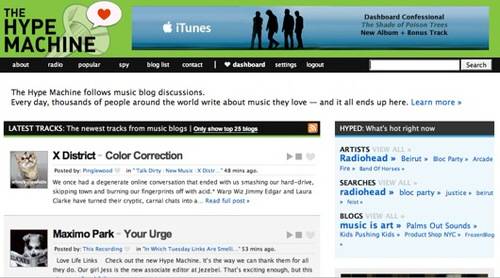In yesterday’s episode of RWW Live, our live podcast show, our topic was online music and we had 3 very special guests on the show: Dalton Caldwell, founder and CEO of Imeem; Lucas Gonze, founder of Webjay and until recently a senior member of the Yahoo Music team; and Rob Williams, Senior VP of Music Software at RealNetworks. Also on the show were Sean Ammirati (host), Richard MacManus and Marshall Kirkpatrick. The audio is archived below for your listening pleasure.

In this post we feature some of the highlights from the show, which included many interesting factoids about Imeem, Yahoo Music and Rhapsody. But more importantly there was a lot of fascinating discussion of online music trends and where the music industry is headed.
What Are The Killer Features for Online Music?
The show started with a discussion about the killer feature set for online music, based on a post Marshall wrote recently. Marshall noted that the user experience in online music is not as good as it should be in streaming music websites.
In reply Lucas said that the listening experience has changed since around 2000 – e.g. people who follow mp3 blogs enjoy the personalities and the “constant sense of flow” of new music. In terms of streaming music, he said that there is a close connection between the songs and the community – it isn’t intended to be decoupled. He said an ideal listening experience now is one that mixes music with fun, the social aspects.

Dalton said that Imeem started out as a social network, then the music came later – not the other way round. They slowly added music features, as people asked for them; and that has steered the product. He said that online music shouldn’t be about consumption, but online community and self-expression. He thinks sites that are primarily community focused, rather than just listening to lots of music, are the ones that have succeeded most in online music. He also said technical advantages are key – he pointed to Imeem’s acquisition of Snocap and its upload technology.

Sean asked Dalton a bit more about how Imeem got into music. Dalton replied that originally Imeem was meant to be a social network where people could express their tastes in media, whether that be video, music, etc. But they have turned into a music specific site, due to how their market evolved.
Rob from RealNetworks talked about how Rhapsody has had success in web services. He said they’re continuing to build out their APIs across a range of devices. He spoke about their partnership with iLike. He says music discovery, social networking and music creativity are important features these days. The way they do things is work on the backend and partner with lots of companies. One point that resonated with us was that online music services should work more together, in a federated way. e.g. you can move personalization data around and get recommendations across the likes of last.fm, Imeem, Rhapsody etc. He mentioned OAuth and OpenID as some of the standards being used to do this.

Developer Platforms
Lucas segued off Rob’s point about standards, using that to point out a key difference between Imeem and Rhapsody. He said that Rhapsody is a ‘pure play’, it’s for obtaining music. Whereas Imeem is a social network that uses provisioning to complement its strategy. So which of these two things will be better business models?
Rob’s response was that Rhapsody has a developer program which it is using to expand its reach. He said that Imeem focuses on developers too, but they focus more on web developers whereas Rhapsody targets hardware developers too. Dalton agreed that they focus on web developers.
Marshall asked Dalton for an update about the Imeem developer platform and specifically how it compares to the “wide open” Seeqpod API, which has been leveraged a lot. Dalton replied that there are 2 ways the Imeem platform is encompassed – the ‘off website’ version and the ‘on Imeem’ one. The widget and embeds is being integrated into eg Slide’s Top Friends, and Apture (a blog plug-in that features an Imeem player). In terms of the ‘on Imeem’ API, that hasn’t been shipped yet. That will be similar to Facebook’s platform, so that developers can build new media experiences inside Imeem.
Business Models for Platforms
Sean asked a question from the podcast audience, about what Imeem’s business model is for their platform. Dalton replied that the vision is to make it mostly ad-supported. They also want to do rev share. They still have to complete building out the technology for ad serving for online music. He doesn’t think the subscription model would work for their audience.
Lucas said there is a lot of skepticism in the music industry (labels, artists etc) about ad-supported revenue.
Marshall mentioned that recorded music is just a loss leader, and monetization can be made with tours, merchandise etc. Rob replied that for artists there is a lot of money in that. So he said there are really good businesses being built off the online music platforms – eg recommednation engines like last.fm, connecting artists to their fan base (e.g. iLike), Ian Rogers’ new company topspinmedia.
Dalton said that at Imeem they’re trying to change the relationship people have with music, focusing not on monetizing consumption, but monetising self-expression and attention in music.
Imeem screenshot

Lucas said that the value in online music isn’t in the download, but in all the things around it – socialising, shows, etc. So the business is in supporting the user to do all those things.
DRM & Interoperability
Marshall brought up the topic of DRM. He said that there seemed to be 3 different points in the spectrum of DRM in online music:
a) Rhapsody embraces DRM the most and the requirement that subscription be ongoing;
b) Imeem playing in the middle with Google Open Social integration;
c) Yahoo focuses on open standards
So Marshall asked how long will big players be able to use their large audience to compete with small more open players?
Lucas said that he no longer speaks for Yahoo, but they’ve changed over the last six months to “embrace openness and become a connector”. Yahoo Music eschewed its own subscription product and made a deal with Rhapsody. He said that interoperability with Imeem would probably also be a popular move within Yahoo. He said though that there is immaturity of current open products, specifically mentioning OpenSocial. Secondly, companies like Yahoo need to figure out how to make money from the open strategy. He said that Rhapsody’s strategy is very open, but the big question is can that be extended to record labels and artists as well as users.
Rob didn’t agree with the characterisation that Rhapsody was pro-DRM. He noted that at the end of June they launched a DRM-free music store (ReadWriteWeb coverage here). He also said that they’re big supporters of the ad model. He also said that partnerships are an important part of their strategy, e.g. powering Yahoo Music and iLike (which gets them into Facebook). He told us that some demographics accept ads, but they’ve had issues eg with the Facebook crowd. So he said a blended approach is what they’re pursuing – part ads, part track sales, part subscriptions, part discovery/buying track for your phone, etc. He said that music is a $10b market in the US, but so far only $1b of that is online.
Rhapsody DRM-free store

Legal Battles With Record Labels
At this point I asked a question about the legal issues with online music, specifically pointing out that there is a ‘have’ and ‘have not’ situation in online music currently – with larger sites like Imeem, Yahoo, Rhapsody being able to make partnerships with record labels and avoid the legal issues plaguing the likes of Pandora, Muxtape and other small startups.
Lucas said there are two markets emerging: large scale, partnerships with labels, big traffic but low profit margins (Yahoo, Imeem, et al); the second market is small scale, uses media like artist sites, works in the “grey area” in terms of legal issues, has smaller traffic but higher margins. He points to Hype Machine as an example of the latter, which isn’t paying anything [to record labels]. He said these two margins are emerging in parallel. He said that Muxtape was a red herring, as it was trying to become a big service, i.e. get too big to fail and so cut a deal [with labels].
Muxtape woes with the RIAA

Lucas said in a couple of years the wall between the large providers and small ones will start to go away, as music becomes more “webby” and interoperable.
Dalton said that small companies need to steer clear of the major record labels in order to survive.
Rob said that the backend, platform approach will make this easier, as small companies can use the big platforms provided by Rhapsody and others. So that is one way to avoid the legal hassles of music acquisition from music labels. Dalton said that he agrees, noting that at Imeem they try to “abstract away all the complexity” around licensing and streaming and hosting. He also said they acquired Snocap partly to get access to their registry of music from the major record labels as well UGC (user generated content) music. This enables them to build a platform that scales from UGC music to major record label music. So he says there should be no reason for startups not to use a platform in a couple of years.
Marshall brought up the issue of international. Rob said it’s very tough, they have enough problems dealing with US laws around rights to use music. He said Pandora has had lots of issues with international laws. He said it probably will be never fully global, so it will stay in “the grey area” for many countries.
Who Will be the Leading Online Music Services 1 Year From Now?
To wrap up the podcast, Sean asked everyone about the current poll we’re running on RWW (see below). last.fm and Pandora are still the most popular apps with our readers, so Sean asked which apps will be the leaders a year from now?
Rob said that he hopes Pandora is still around and the statutory radio issues get worked out across the industry. He said there will probably be a number of new contenders, and he hopes there will be much more cross-service users (i.e. the ability to use more than one service).
Lucas said that Hype Machine has the opportunity to get pretty big.
Dalton said that the line between social networking services and music services is blurring, so he thinks apps that aren’t just about music may become most influential – e.g. iPhone apps.
Marshall said he has high hopes for Hype Machine (our initial review and update) and also thinks Songbird (our review) has potential, with so many developers and an open framework.
I said that music discovery is key for me, finding new music. The likes of last.fm, Pandora, Imeem, Hype Machine are doing this for me now, but given Imeem’s rapid growth recently there will probably be another 1-2 services that emerge over the next year that take discovery to the next level.
Hype Machine, beloved by a few in the panel

Listen
You can listen to the entire show here (select Episode 6):

Note about the podcast: We experienced technical issues with our podcast hosts Talkshoe during the recording, which affected our live listeners. Many people either couldn’t login to the call or were thrown off midway through (including the host Sean!). We sincerely apologize for this, and we are looking into an alternative solution for upcoming shows. We’re pleased to say though that the archived recording is 100% intact!
Vote
Don’t forget also to vote in our current poll: What are your favorite online music streaming services?
Image: She sings, she sings by gwen





















